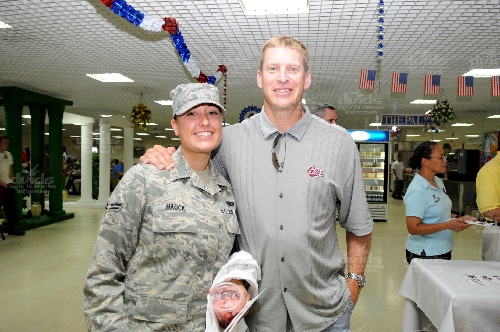Hauck still inspired by Afghanistan visit
An American soldier lay in his Afghanistan hospital bed, recovering from a gunshot wound near his knee sustained earlier that July morning. Another bullet had entered near his stomach and exited through his side.
All the soldier wanted to do was return to the fighting -- to do his job.
"Shoot, Coach, I'll be back out there in two or three weeks," the soldier told Bobby Hauck, now UNLV's football coach.
The soldier sounded like a player talking about returning to the football field, Hauck said.
That dedication to duty has stuck with Hauck nearly nine months after he traveled to Afghanistan and other military installations in the Middle East to visit with U.S. troops.
Facing the constan t threat of mortar attacks and improvised explosive devices (IEDs), soldiers displayed courage and commitment that impressed Hauck during a 12-day trip. He heard soldiers speak of their duties in businesslike terms and tones. They sounded more like discussions in an office rather than in one of the world's most dangerous regions.
"I didn't know what I would see when I went over there," Hauck said. "I didn't know if I would see a tremendous amount of waste, if I would see people that didn't want to be there. I just didn't encounter that.
"I thought they were very efficient. I thought they were motivated. I thought they were competent. Our troops were really impressive, in terms of the logistics, in terms of duty and in terms of attitude."
Hauck, Montana's coach at the time, took a commercial flight to Qatar before boarding a military plane to Afghanistan. The trip was organized by Koeberle & Associates, a Pittsburgh-based sports and entertainment marketing agency.
Other college coaches -- Idaho's Robb Akey, James Madison's Mickey Matthews, Rice's David Bailiff and Army co-defensive coordinator Chris Smeland -- also made the trip.
Hauck spent most of his stay at the Kandahar and Bagram air bases. From those spots he ventured to other bases closer to what could be considered the front lines in the war against terror.
An attack at one forward base caused Hauck and his group to abort that leg of the trip. At least twice at Bagram, rocket attacks sent Hauck scurrying for a bunker.
But he said he never worried about his safety, saying security was high and often handled in secrecy.
"They take their security seriously," Hauck said.
Instead of focusing on the perils around him, the coach in Hauck wanted to absorb as much information as he could about those in the military and what they faced. He asked many questions and said those guiding him probably grew weary of his constant probing.
But mostly Hauck was there to see the situation firsthand and how it contrasted to what he was reading or seeing on TV. Reports then said the Taliban was gaining the upper hand, but soldiers told Hauck they were succeeding and determined to complete the task.
There were enough signs, too, that gave Hauck a sense of the danger nearby. Military personnel were armed wherever they went, whether out for a run or eating dinner.
And like the soldiers he traveled with, Hauck wore body armor weighing almost 40 pounds in 100-degree heat.
He also saw how much planning goes into such an operation. Detailed plans have to be assembled to establish living quarters and ensure the availability of seemingly insignificant items such as soap.
It puts the planning on how to beat a cover-2 defense into stark perspective.
No sport, however, has been compared to the military more often than football. The complexity, discipline and attention to detail are similar even though the stakes are considerably different.
When Hauck returned to Missoula, Mont., before last season, he put together a PowerPoint presentation for his Montana team, and he plans a similar one for UNLV's players.
The experience also drove home the point for Hauck that there is no comparison between trying to win a game and fighting a war.
So don't expect to hear him use a term such as "battle" when describing a game against UNR, even if Wolf Pack coach Chris Ault is known as ''The Little General.''
"In theory, you're giving something to the armed forces when you go over there," Hauck said. "When you come back, you realize you got way more out of it than you could ever give."
Contact reporter Mark Anderson at manderson@reviewjournal.com or 702-387-2914.






















